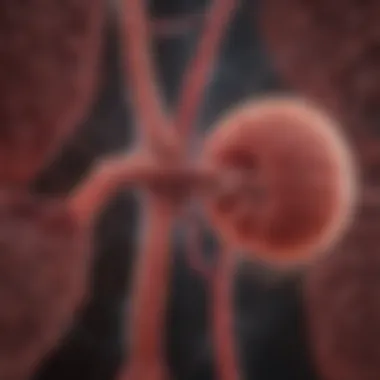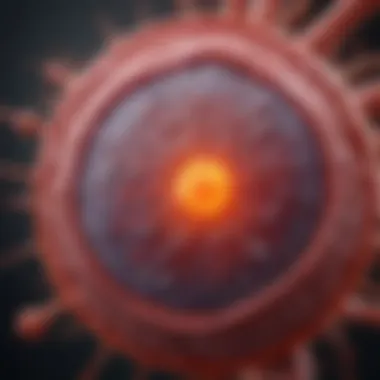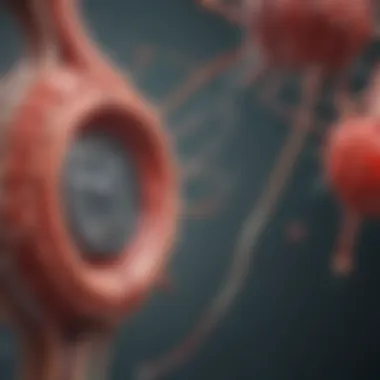Kidney Cancer and High Blood Pressure: Unraveling the Link


Intro
Kidney cancer, particularly renal cell carcinoma, has garnered significant attention within the medical community. Recent studies underline the dysregulation of various physiological systems in cancer patients. High blood pressure, or hypertension, has been identified as one contributing factor to this discord. The relationship between these two conditions presents a growing area of research, prompting exploration into how hypertension may influence cancer development and prognosis.
Patients with pre-existing hypertension are observed to have varying outcomes when diagnosed with renal cell carcinoma. The mechanisms behind this interplay are complex and multifactorial, involving a mix of genetic, environmental, and lifestyle factors.
Awareness of this connection is crucial for healthcare professionals, as it influences management strategies beyond traditional treatment modalities. By understanding how kidney cancer and hypertension intersect, there is potential to enhance patient care and treatment effectiveness, thereby improving overall prognosis.
Preface to Kidney Cancer and High Blood Pressure
Effective patient care requires a comprehensive grasp of how these conditions can affect one another. For instance, hypertension can exacerbate kidney function impairment, leading to more serious health issues. Conversely, the physiological effects of advanced kidney cancer may influence blood pressure regulation and cardiovascular risk.
Therefore, an exploration of how kidney cancer and high blood pressure interrelate will provide critical insights for optimizing patient management and enhancing treatment protocols. This section sets the stage for deeper investigation into the definitions, implications, and relevance of these conditions.
Defining Kidney Cancer
Kidney cancer refers to malignant tumors that originate in the kidneys, with renal cell carcinoma being the most common type. It occurs when cells in the kidney's lining grow uncontrollably, leading to tumor formation. Patients often present with symptoms such as blood in the urine, persistent back pain, and weight loss. However, early stages may be asymptomatic, complicating timely diagnosis. Genetic mutations and environmental factors can also attribute to its development, making it a multi-faceted disease.
Understanding High Blood Pressure
Hypertension, or high blood pressure, is when the force of blood against the artery walls is consistently too high. It may lead to serious health complications if left unmanaged, including heart disease and stroke. Levels above 130/80 mmHg are usually considered high. While a healthy lifestyle can mitigate risks, genetic predispositions play a crucial role. Often categorized as primary or secondary, high blood pressure can arise from various underlying health conditions, including kidney-related issues.
The Significance of Their Relationship
The link between kidney cancer and high blood pressure is of significant concern in health care. Studies suggest that individuals with hypertension are at higher risk for developing renal tumors. Moreover, the presence of kidney cancer can lead to secondary hypertension due to tumor compression of blood vessels or hormone production associated with the cancer. This bidirectional relationship complicates the treatment approaches and necessitates attentive monitoring by healthcare providers. Understanding these dynamics is vital for both early detection and effective management of affected patients.
Epidemiology of Kidney Cancer
Understanding the epidemiology of kidney cancer is crucial for grasping the complexity surrounding its relationship with high blood pressure. Epidemiological studies provide valuable insights into the incidence and prevalence of kidney cancer, allowing for better risk assessment and management strategies. Moreover, analyzing demographic factors helps to identify high-risk populations, informing targeted prevention and intervention efforts. Identifying associations with risk factors can lead to significant public health initiatives aimed at reducing the burden of this disease. This section will cover the following key areas:
- Incidence and Prevalence
- Demographic Factors
- Risk Factors Associated with Kidney Cancer
Incidence and Prevalence
The incidence rate of kidney cancer refers to the number of new cases diagnosed in a given timeframe, typically expressed per 100,000 people. In contrast, prevalence indicates how widespread the disease is within a population at a specific point in time. Overall, the incidence of kidney cancer has shown a slight increase globally over recent decades, likely related to improved imaging techniques and increased awareness among healthcare providers and patients.
Key statistics indicate that around 76,000 new cases of kidney cancer are diagnosed in the United States each year. The disease is more common in men than women, with men being twice as likely to be diagnosed. Certain populations exhibit higher prevalence rates, particularly in regions with higher smoking rates or obesity prevalence.
Demographic Factors
Demographic factors play a significant role in the epidemiology of kidney cancer. Age is a primary factor, as the majority of cases are diagnosed in individuals over the age of 60. Other factors include race and ethnicity. For instance, studies indicate that African Americans face a higher risk than white individuals, while Asians tend to have lower rates.
Furthermore, socioeconomic status affects both the prevalence and outcomes of kidney cancer. Individuals from lower socioeconomic backgrounds may have limited access to healthcare, resulting in later-stage diagnoses and poorer outcomes. Factors such as education and health insurance significantly influence preventive measures such as screenings.
Risk Factors Associated with Kidney Cancer
Several risk factors are consistently associated with the development of kidney cancer. Among these, high blood pressure stands out as a significant contributor. Additional factors include:
- Obesity: Increased body mass index is a well-known risk factor, linking to metabolic syndrome.
- Smoking: Tobacco use is linked to renal carcinoma, affecting both smokers and those exposed to secondhand smoke.
- Family History: Genetic predisposition can occur in families with a history of kidney cancer.
- Chronic Kidney Disease: Long-term kidney issues heighten the likelihood of developing cancer.
- Certain Medications: Long-term use of painkillers like nonsteroidal anti-inflammatory drugs may increase kidney cancer risk.


These factors collectively underscore the complexity of the disease's etiology, emphasizing the importance of a multi-faceted approach in addressing both kidney cancer and high blood pressure.
High Blood Pressure and Its Role in Cancer
High blood pressure, or hypertension, is known primarily for its cardiovascular risks, but its implications extend well beyond the heart. This section explores the critical role of high blood pressure in the context of cancer, particularly kidney cancer, establishing a framework for understanding its contribution to the disease's progression and pathology. It is essential to examine how hypertension may not only coexist with cancer but may actively influence cancer processes.
Pathophysiological Mechanisms
Hypertension can instigate various physiological changes that may contribute to cancer development. One primary mechanism is the alteration in blood flow and vascular health. High blood pressure can cause damage to blood vessels, leading to a microenvironment conducive to tumor growth. This damage can enhance the permeability of blood vessels, facilitating the spread of cancerous cells.
Moreover, high blood pressure is often associated with increased levels of certain hormones, such as renin and angiotensin II. These hormones can promote inflammation and cellular proliferation, both of which are significant drivers in the pathology of renal cell carcinoma. The hypertension-associated changes can create conditions favoring cellular transformation, where normal cells begin to exhibit malignant behaviors.
Impact of Hypertension on Cellular Processes
Hypertension influences a range of cellular processes that can enhance tumorigenesis. One critical effect is on angiogenesis, the formation of new blood vessels. Tumors require a robust blood supply to grow, and hypertension can stimulate angiogenic factors that aid in developing these vessels. As a result, the tumor's ability to receive oxygen and nutrients is significantly enhanced.
Additionally, hypertension can affect apoptosis—the process of programmed cell death—which is crucial for maintaining cellular homeostasis. Under hypertensive conditions, there is a tendency for cells to evade apoptosis, leading to a survival advantage for cancer cells. This resistance further compounds the challenges in treatment and management, as these cells are less likely to respond to therapies designed to induce cell death.
"Understanding how high blood pressure contributes to the mechanisms of cancer is vital in developing effective treatment strategies."
In summary, the interplay between high blood pressure and the cancer process is complex and multifaceted. It is crucial for researchers and healthcare professionals to recognize these connections to enhance patient management strategies and tailor interventions effectively.
The Bidirectional Nature of Hypertension and Kidney Cancer
The relationship between hypertension and kidney cancer exemplifies a complex interplay that warrants serious exploration. Acknowledging this bidirectional nature is vital as it highlights how these conditions influence each other. Current research indicates that not only can hypertension elevate the risk of developing kidney cancer, but kidney cancer can also alter blood pressure regulation. Understanding this dynamic assists healthcare professionals in recognizing higher-risk patients and tailoring effective management strategies.
Hypertension as a Risk Factor for Kidney Cancer
Numerous studies indicate a significant correlation between elevated blood pressure and the incidence of renal cell carcinoma, the most common type of kidney cancer. Hypertension may facilitate carcinogenesis through several mechanisms, including increased renal perfusion pressure and altered renal microenvironment. Chronic high blood pressure can lead to vascular damage and inflammation, which may create a more conducive environment for cancer cell growth.
Research suggests that specific hypertensive medications, particularly angiotensin-converting enzyme (ACE) inhibitors, may have protective effects, further complicating the risk factors associated with hypertension and kidney cancer. Individuals with a family history of hypertension might face an even higher risk, underscoring the importance of thorough patient histories during clinical evaluations.
Kidney Cancer Impacting Blood Pressure Regulation
Conversely, the presence of kidney cancer can profoundly affect blood pressure regulation. Tumor growth can disrupt normal renal functions, potentially leading to secondary hypertension. Renal tumors may produce hormones like erythropoietin, which can induce hypertension through increased blood volume. Tumors may also cause renal artery obstruction, further complicating blood flow regulation.
Additionally, treatments for kidney cancer, such as surgical interventions, may have variable impacts on blood pressure management. For instance, nephrectomy may lead to changes in blood flow dynamics, which could transiently elevate blood pressure in some patients.
"The risk factors associated with hypertension and kidney cancer underscore the significance of a holistic approach to patient care."
Recognizing the connection can help in preventing progression and improving patient outcomes by facilitating early intervention and personalized treatment plans.
Clinical Implications of Comorbidity
The coexistence of kidney cancer and high blood pressure holds significant clinical implications that cannot be overlooked. Understanding these implications is essential for healthcare professionals who engage with patients facing these two conditions. The intricate link between hypertension and cancer often complicates diagnosis and treatment, making it crucial to address this interplay systematically. Many patients with kidney cancer may already have preexisting hypertension, or they may develop high blood pressure as a consequence of cancer treatments. This complexity necessitates a multifaceted approach in patient care, focusing on both conditions simultaneously.
A comprehensive understanding of the comorbidity can lead to better screening practices and management strategies. This helps in identifying at-risk populations early and allows for timely interventions. Moreover, being aware of this interplay enhances the quality of life for patients, as it enables a more precise management plan tailored to individual needs.
"Comorbidity increases the challenge of managing both hypertension and cancer effectively, often requiring an inter-disciplinary approach."
Screening Recommendations


Regular screening for hypertension in patients diagnosed with kidney cancer is paramount. It aids in the timely identification of any elevation in blood pressure, thus facilitating prompt intervention. Healthcare providers should consider guidelines set forth by leading health organizations to implement regular blood pressure checks during oncology consultations.
Moreover, patients at higher risk, including those with a family history of either condition or preexisting risk factors such as obesity and diabetes, should undergo more frequent screenings. These screenings may take the form of:
- Routine blood pressure checks: Typically every visit to the healthcare provider.
- Home monitoring: Encouraging patients to monitor their blood pressure at home can provide a more comprehensive view of their condition.
- Referral to specialists: In cases of significantly elevated blood pressure, referral to a cardiologist might be beneficial.
Implementing a screening protocol not only enhances patient outcomes but also contributes to the broader understanding of how kidney cancer and hypertension affect each other.
Management Strategies for Patients
Managing patients with both kidney cancer and high blood pressure mandates a multidisciplinary approach. This involves coordinated care between oncologists, nephrologists, and primary care physicians. Key strategies include:
- Medication management: Antihypertensive medications should be carefully selected to avoid interactions with cancer treatments. For instance, certain diuretics may be beneficial while others could exacerbate renal issues.
- Regular follow-up: Frequent monitoring of both the cancer and hypertension status is necessary. Scheduled visits can help track the effectiveness of treatment plans and make adjustments as needed.
- Patient education: Educating patients about the significance of managing both conditions is critical. They should be made aware of potential side effects of medications and encouraged to report unusual symptoms promptly.
Lifestyle adjustments also play a role. Recommendations around diet and exercise can help manage hypertension and improve overall well-being in cancer patients. A healthy lifestyle supports not only physical health but mental well-being as well. It underscores the importance of a holistic view in treating individuals facing dual health challenges.
In summary, comprehending the clinical implications of comorbidity between kidney cancer and high blood pressure is vital for optimizing patient care and treatment outcomes.
Pharmacological Management
Pharmacological management represents a critical component in the care of patients who experience both kidney cancer and high blood pressure. This aspect focuses on how to effectively manage these interrelated conditions through the use of medications. For patients with kidney cancer, understanding the medicinal landscape is essential. Antihypertensive medications can aid in controlling blood pressure, while targeted therapies can offer potential benefits against cancer progression. Therefore, the intersection of both pharmacological approaches becomes crucial in clinical practice.
Antihypertensive Medications
Antihypertensive medications are vital for managing high blood pressure, particularly in individuals with kidney cancer. These drugs work by blocking various mechanisms that raise blood pressure, allowing for improved cardiovascular health. Common classes include
- ACE inhibitors such as Enalapril and Lisinopril, which help relax blood vessels.
- Beta-blockers like Metoprolol, which reduce heart rate and workload on the heart.
- Calcium channel blockers such as Amlodipine, which prevent calcium from entering cells of the heart and blood vessels.
Each class has its benefits and considerations depending on the patient’s clinical profile. For instance, ACE inhibitors not only manage blood pressure but may also provide renal protective properties, which is beneficial in kidney cancer. Prescribing these medications requires careful consideration of potential side effects and interactions with cancer therapies.
Targeted Therapies for Kidney Cancer
Targeted therapies have transformed the treatment landscape for kidney cancer. Unlike traditional chemotherapy, these therapies focus on specific molecular targets associated with cancer progression. Examples of targeted therapies include:
- Tyrosine kinase inhibitors, such as Sorafenib and Sunitinib, which block cancer cell growth.
- mTOR inhibitors, like Everolimus, which disrupt the growth signals inside tumor cells.
These interventions allow for more effective treatment, with potentially fewer side effects compared to broader chemotherapy options. It is important for clinicians to consider the patient's blood pressure status when initiating these therapies, as some can influence vascular health.
"In managing kidney cancer, the strategic use of targeted therapies can lead to significant improvements in patient outcomes."
The use of pharmacological management not only targets the cancer directly but also considers the overall health of the patient, especially in relation to hypertension. This dual focus enhances the quality of care for patients navigating these complex conditions.
Lifestyle Modifications
Lifestyle modifications play a crucial role in managing both kidney cancer and high blood pressure. Making intentional changes in daily habits can significantly impact overall health and well-being. These modifications not only help in controlling hypertension but also aid in improving the quality of life for patients diagnosed with kidney cancer. Emphasizing the importance of lifestyle changes is essential for both patients and healthcare providers.
Dietary Recommendations
Diet is foundational to health, particularly for individuals facing kidney cancer or hypertension. It is vital to focus on a balanced diet rich in nutrients while limiting sodium intake to manage blood pressure effectively.


- Fruits and Vegetables: These foods are high in vitamins and antioxidants. They can strengthen the immune system, which is crucial for individuals dealing with cancer.
- Whole Grains: Foods like brown rice and whole wheat bread provide necessary fiber, promoting digestive health.
- Lean Proteins: Options such as fish, chicken, and legumes can provide essential protein without excessive fat, which helps in managing weight.
- Limiting Processed Foods: Processed foods often contain high levels of sodium, which can exacerbate high blood pressure.
In addition, it is important to stay hydrated. Adequate water intake can support kidney function and assist in managing blood pressure levels. However, patients should consult healthcare professionals regarding fluid intake, particularly if they are undergoing treatment for kidney cancer.
Physical Activity and Its Benefits
Regular physical activity provides multiple benefits for individuals with either high blood pressure or kidney cancer. Engaging in physical exercise strengthens the heart, regulates blood pressure, aids in weight management, and can even help reduce cancer treatment side effects.
- Aerobic Exercise: Activities such as walking, cycling, and swimming can help improve cardiovascular health. Aim for at least 150 minutes of moderate-intensity exercise each week.
- Strength Training: Incorporating strength exercises can improve muscle mass and metabolism, which is beneficial for maintaining a healthy weight. Limit lifting heavy weights; focus on body-weight exercises initially.
- Flexibility and Balance Exercises: Practices like yoga and stretching can enhance flexibility and reduce stress.
It's important that individuals consult their healthcare professionals before beginning any new exercise program, especially those with existing health conditions.
Psychological Well-being and Stress Management
Mental health is often overlooked in managing chronic conditions such as kidney cancer and high blood pressure. Stress can exacerbate both conditions and hinder treatment effectiveness. Thus, incorporating strategies to improve psychological well-being is essential.
- Mindfulness and Meditation: These practices can help reduce stress. Setting aside time each day for mindfulness meditation can lead to improvements in emotional health.
- Counseling and Support Groups: Speaking with mental health professionals or peers can provide needed emotional support. Sharing challenges with others can foster resilience and hope.
- Hobbies and Leisure Activities: Engaging in enjoyable activities can distract from stressors and promote a more positive outlook. This can include reading, gardening, art, or even spending time with loved ones.
Addressing both physical and emotional health creates a holistic approach to managing kidney cancer and high blood pressure.
Adapting lifestyle modifications requires commitment and effort. However, these changes are often achievable and can lead to significant improvements in health outcomes.
Research Directions and Future Perspectives
Current Studies and Trials
Various current studies aim to clarify the relationship between hypertension and kidney tumors. Key elements being examined include:
- Longitudinal Studies: Research like the Kidney Cancer Cohort Consortium investigates the long-term effects of high blood pressure on kidney cancer progression. These studies focus on treatment outcomes and patient survival rates.
- Pharmacological Investigations: Trials are underway that evaluate how antihypertensive medications may impact the growth of renal tumors. For example, some studies suggest that certain classes of drugs may reduce the risk of tumor progression.
- Biomarker Discovery: Researchers are exploring specific biomarkers. Identifying these can lead to earlier detection of both kidney cancer and hypertension, facilitating timely intervention.
Importantly, the outcomes of this research may revolutionize clinical standards for monitoring and treating patients with both conditions. Data from studies can provide critical insights for healthcare professionals on the management of comorbid patients.
Potential for Novel Therapeutics
The exploration of treatments that target both kidney cancer and high blood pressure brings promise. Novel therapeutics in development focus on the following aspects:
- Dual-Action Medications: Investigative drugs designed to lower blood pressure while simultaneously inhibiting tumor growth are being studied. This dual approach is particularly compelling, as it may offer a more effective solution for patients suffering from both conditions.
- Precision Medicine: Advances in genomic research are paving the way for more tailored treatment regimens. This includes identifying genetic predispositions that may signal a higher risk for kidney cancer in hypertensive patients.
- Combination Therapies: Certain trials examine the effects of combining existing cancer therapies with hypertension medications. The hypothesis is that controlling blood pressure may enhance the efficacy of cancer treatments, leading to improved patient outcomes.
As ongoing research unfolds, the intersection of kidney cancer and hypertension may unveil significant opportunities for innovation in treatment approaches.
"Our future understanding of kidney cancer will depend greatly on the ways we can interlink its research with other comorbidities, such as high blood pressure."
End
Summary of Key Findings
The key findings presented in this article emphasize several pertinent aspects:
- Epidemiological Insights: The relationship between kidney cancer and hypertension has been well documented, with studies linking high blood pressure as a potential risk factor for the development of renal malignancies.
- Pathophysiological Links: Hypertension can contribute to the advancement of kidney cancer through complex biological mechanisms. Conversely, kidney cancer can exert pressure on cardiovascular health, creating a cycle of worsening conditions.
- Clinical Implications: Effective management strategies should integrate hypertension control with cancer treatment, aiming for a holistic patient care approach. Regular screenings and tailored management plans are essential.
Implications for Patient Care
Implications for patient care extend beyond routine management and highlight the need for interdisciplinary collaboration among nephrologists, oncology specialists, and primary care providers. Specific considerations include:
- Prevention Strategies: Emphasizing the need for lifestyle modifications aimed at controlling blood pressure may reduce the risk of kidney cancer, leading to preventative care measures.
- Screening Guidelines: Regular monitoring for high blood pressure in at-risk populations can facilitate earlier diagnosis and intervention for both hypertension and kidney cancer, potentially altering disease trajectories.
- Tailored Treatment Plans: Incorporating patient-specific factors—including existing comorbidities and treatment preferences—into management strategies will enhance the efficacy of care.
Understanding the interrelation between kidney cancer and high blood pressure enables the development of comprehensive approaches that can greatly benefit patient care.







